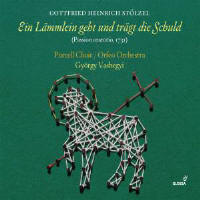Texte paru dans: / Appeared in: Glossa Code-barres / Barcode : 8424562240063 |
|
| " Highest possible recommendation. " | |
|
Reviewer: David
Reznick Once a previously unknown composer is presented to the public, via scholarship and recordings, the verdict is handed down. Do we have a new master, or a wannabe, or something in between? Deciding that is the easy part; the hard part is discovering him in the first place. In 18th-century Germany, each city and town had its cathedral, and each one had its musical director. In many cases, a musicologist could just pick one and study it as a career. Bach and Handel had no trouble rising to the top and staying there. But others had to wait, and some will wait forever. So it’s a wonderful thing to see a record company like Glossa at work bringing to the public unfamiliar music, each release adding to our understanding of the period. The man behind it, Györgi Vashegyi, has issued eight discs so far, and we can only hope he will continue. The idea is not unearthing lost masterpieces—there will never be enough of those to go around.
However, his latest offering might well hit the jackpot. Gottfried Heinrich Stözel (1690–1749) held the post of Kapellmeister at the court in Gotha. Like so many Baroque masters, he had a sterling reputation all over Germany. Bach knew and admired him. But like so many others, his fame did not outlast him. And consequently, most of his massive output has been lost. One of the survivors, Ein Lämmlein geht und trägt die Schuld (A little Lamb bears all the guilt), is presented here. This is a passion oratorio, and so there could hardly be anything so ripe for comparison with music we already know from the same period.
In all my reading, I’m not sure I’ve ever even come across the name of this composer. But I’ve certainly spent lots of idle time (my favorite kind) contemplating Bach, wondering how such a man could exist, trying to find the man behind the monument. And I’ve taken advantage of every opportunity to hear a live performance of the St. Matthew Passion. For me, this is the music at the heart of the Bach enigma. I’m sure he was humbled to be able to create this towering masterpiece; but its very existence is a call to examine one’s life in the face of what can be done with a human brain and heart. And it also conjures up visions of Bach’s congregation, listening in the pews, and I can only wonder how they were able to sit through such a phenomenon? Piety? Guilt? Or did they sell sandwiches during the recitatives?
Well, here is a passion by another composer (who, by the way, also wrote his own libretto). It can’t be compared to Bach. What can? But this music reveals itself from the very beginning: It is sweet. It is melodious. It moves forward effortlessly. It speaks of joy, and love, and hope. It makes few demands on the musicians and the congregation. And it sounds like nothing else I’ve ever heard in a lifetime of Baroque study. I’m pretty sure that if history had taken a different term, the 18th century might now be thought of as the age of Bach, Handel, and Stölzel.
| |
|
|
|
|
|
|
|
Cliquez l'un ou l'autre
bouton pour découvrir bien d'autres critiques de CD |
|




